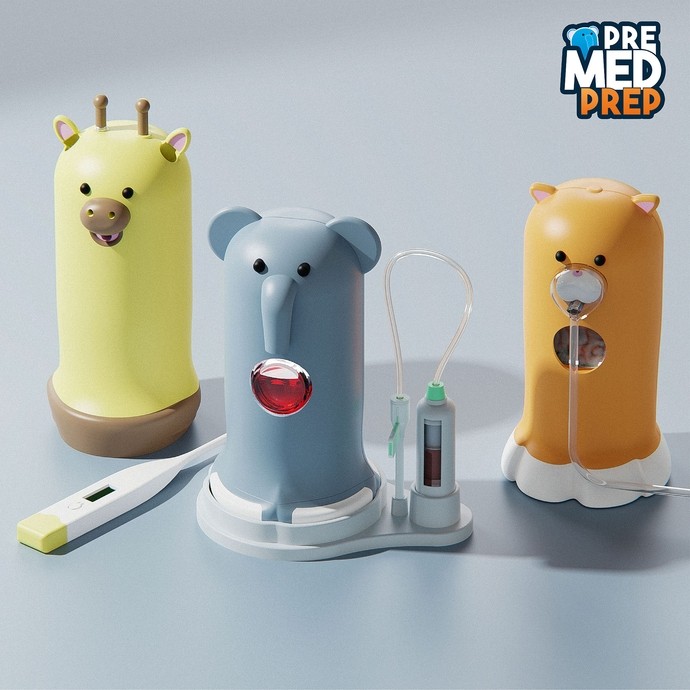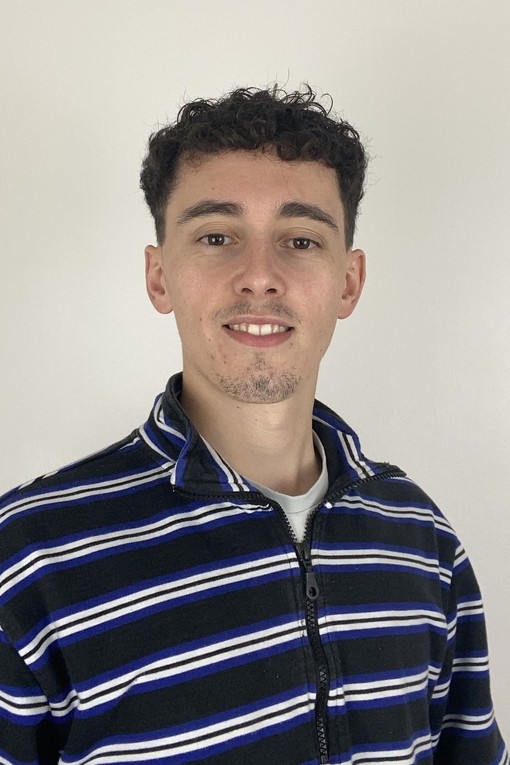Animal magic! PreMedPrep products to improve children’s medical experiences
A new collaboration is underway between the University of Wales Trinity Saint David’s (UWTSD) Assistive Technologies Innovation Centre (ATiC) and one of its Master’s students, to improve children’s medical experiences.

ATiC is working with MSc Industrial Design student Adam Higgins as he develops his range of PreMedPrep products, which are aimed at preparing children in advance for common healthcare procedures such as blood tests, heart and temperature examinations, and nebulisers for medication intake.
“Healthcare procedures can often cause children to experience anxiety, fear, and stress because of a ‘fear of the unknown’,” said Adam, aged 22, from Rhiwbina in Cardiff, who is a Product Design graduate of UWTSD’s Swansea College of Art.
“A child’s lack of understanding of what is happening to them can lead to a negative experience of medical procedures; it can cause fear and anxiety and affect their future medical visits.
“This can have lasting implications and children will often refuse future treatments, which can lead to longer procedure times and makes the work of healthcare professionals more challenging.”
To address these challenges – for both young patients and healthcare providers – Adam has developed the range of PreMedPrep product prototypes. The products aim to teach, engage, and prepare children for their medical procedure, offering the child a sense of control and autonomy back over their healthcare.
The products provide users with the knowledge of how a procedure works through a realistic procedure demonstration, in an engaging and comforting way through the products’ bright and colourful animal themes.
The collection of three PreMedPrep products are each specific to a certain procedure or examination.
The Elephant, called Eilo, is specific to blood tests. Eilo can provide children with a realistic demonstration of a blood test, using an interactive needle and ‘magic’ syringe. The needle and syringe are designed to look/replicate real medical equipment, making the transition from ‘play’ to real as comforting as possible.
The product is equipped with a viewing window, located on the front, and an exposed tube located on the rear of the product. When a needle is inserted into the elephant, you can see blood empty from the viewing window but also travel through the tube.
These functions give an opportunity for children to understand what is happening inside their own bodies during a real blood test.
The Giraffe, called Geo, tackles common examinations that are often overlooked, specific to temperature and heart rate readings. The product provides real-time readings of temperatures and heart rates, using real medical thermometers and stethoscopes.
The product is programmed to demonstrate what a positive and negative temperature/heart rate is, and is an innovative way to engage children with real medical equipment used in the examinations.
The Tiger, called Tigo, is specific to nebulisers. The product provides a demonstration of how you take medicine through a mask. By pressing the mask to the nose of the tiger, it produces a vapour which can be seen in the viewing window on the front of the product.

The products’ use aims to alleviate the ‘unknown’ and will enable children to achieve mastery of their environment by being better engaged with their treatment. By understanding and preparing for their procedures, it will support them emotionally and cognitively, improving their overall medical experience.
Sean Jenkins, ATiC Principal Innovation Fellow, said: “The team were delighted to be approached by one of the UWTSD’s own Master’s students to access the expertise and cutting-edge facilities available at ATiC. We are looking forward to supporting Adam’s start-up enterprise and to contribute to the successful development of the PreMedPrep products.
“There are no specifically designed products in the current market to support children to understand clinical procedures and reduce their anxiety. Adam aims to introduce procedure-specific products for some of the most common troubling experiences for them, and ATiC is pleased to work with him to achieve this.
“ATiC will be supporting Adam by undertaking product usability evaluations with clinicians and children using our behavioural observation and analysis systems. These interaction insights will enable Adam to refine his design and, with ATiC’s assistance, 3D print new prototypes that can be tested again to improve the products further before they are launched in the market.”
“Studying at UWTSD through my degree and Master’s courses has enabled me to develop the necessary skill set to create, develop, and launch my PreMedPrep product development to the stage it is at now,” added Adam.
“This new collaboration with ATiC and the expertise and facilities I will be able to access as a result will enable me to take the development of my products a stage further. I hope to conduct a detailed analysis of the PreMedPrep product prototypes, using a network of medical practitioners, clinicians, and users to validate and evaluate the designs.
“Consolidating the analysis and insight gained from the practitioners will help develop a revised dependable product, suitable for a future market release.”
Matthew Archer, Senior Lecturer, Wales Institute of Science and Art, said: “Adam is a focused and self-driven student, who embodies our Master’s programme philosophy of inter-disciplinary collaboration to develop and realise his design thinking.
“This project is innovative at multiple levels, in considering all aspects of the user engagement and has benefitted from the expertise within ATiC.”
ATiC, an integrated research centre which puts user-centred thinking and strategic innovation tools into practice through its cutting-edge User Experience (UX) and Usability Evaluation research facility located in Swansea’s Innovation Quarter, is a partner in the £24m Accelerate Wales (the Welsh Health Innovation Technology Accelerator) project.
The pioneering Accelerate collaboration between UWTSD, Cardiff University’s Clinical Innovation Accelerator, Swansea University’s Health Technology Centre, and the Life Sciences Hub Wales, is co-funded by the European Regional Development Fund (ERDF), through the Welsh European Funding Office (WEFO).
